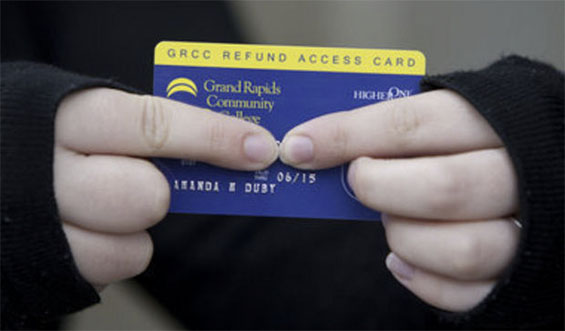
Two affiliated financial firms have been ordered by US bank regulators to pay out over $50 million in fines and restitution to hundreds of thousands of borrowers over allegations of “deceptive” marketing practices concerning student loan disbursement.
Higher One Holdings, Inc of New Haven, Connecticut has been ordered to pay out $24 million in restitution to around 700,000 students in addition to a civil penalty of $2,231,250 by the Federal Reserve.
A separate case against the institution resulted in the Federal Deposit Insurance Corp ordering Higher One to pay $2.23 million.
A related action has also been brought against WEX Bank, who partners with Higher One, by the FDIC, ordering the company to pay $1.75 million in fines.
The FDIC added that the two companies will also be paying $31 million in restitution to an additional estimation of 900,000 customers.
Companies such as Higher One work with colleges across the country to make financial aid payments to students. Once tuition and fees are paid to the school, the leftover money can be used by students to pay for things like books and living expenses through Higher One’s OneAccount, a debit card-based product offered to students in partnership with financial institutions. WEX Bank has offered the product since May 4, 2012, according to the FDIC.
The company is being accused of a number of deceptive practices, such as not telling students how to get financial aid disbursements without signing up for OneAccount, as well as not disclosing information concerning the product’s fees, features, and limitations that are in violation of the Federal Trade Commission Act.
The complaint suggests that the company purposely left out information regarding other disbursement methods available to students, a full and complete fee schedule, and the availability of fee-free ATMs. As a result, the FDIC argues that the company wrongfully collected $31 million in fees from students between May 4, 2012 and July 15, 2014.
“It is important that financial products offered to college students under the sponsorship of their universities are clear, transparent, and trustworthy,” FDIC Chairman Martin J. Gruenberg said. “Today’s action holds both the bank and its student card partner accountable for the practices related to the products they offered to college students and provides restitution to those students harmed by these practices.”
Higher One CEO Marc Sheinbaum released a statement saying the company had made changes to its products and services in an effort to address the issues at hand.
The company has been in trouble in the past with regulators and was ordered to pay $11 million to 60,000 students in 2012 over ATM fees it charged.
Affected students do not need to take any action to collect their compensation. They will be contacted by the financial institutions, writes Mark Huffman for Consumer Affairs.
Just last week the company announced an agreement to sell its disbursement business, which includes OneAccount, to Customers Bank for an all-cash sum of $37 million.




